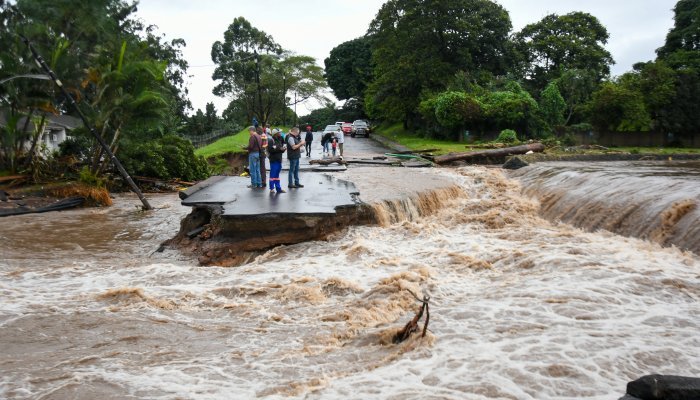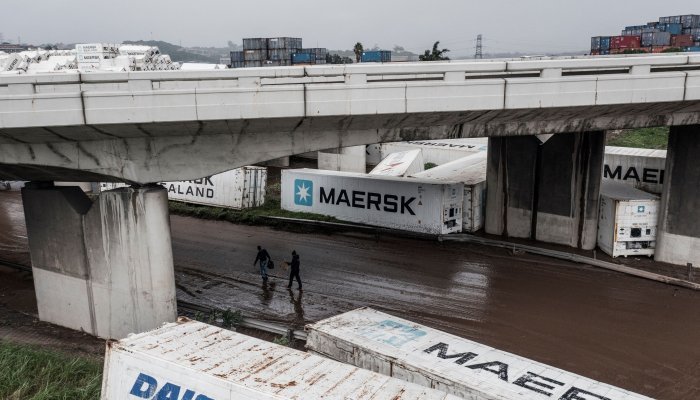In recent years the world has witnessed a rising number of mega weather disasters. Professional services firm AON catalogued these in its 2021 Weather, Climate and Catastrophe Insight report, which referenced the likes of Hurricane Ida in the US, which incurred an estimated economic loss of $75.3 billion; the Haiti earthquake ($1.6 billion loss); flooding across Western and Central Europe ($13 billion loss); the Table Mountain wildfire in Cape Town, which destroyed several buildings on the University of Cape Town campus (loss unspecified); as well as seasonal flooding in China ($30 billion loss) and India ($8 billion).
Natural disaster events and loss trends (2021)
Here at home, KwaZulu-Natal and the Eastern Cape also faced heavy flooding and landslides in April 2022, which took the lives of 448 people, destroyed more than 12 000 homes and caused infrastructure damage of around R12 billion. Speaking to Daily Maverick, Old Mutual Insure’s head of retail, Soul Abraham, called the floods “the biggest natural disaster to have happened to the insurance industry” since the Knysna fires in 2017. The Knysna disaster resulted in some R7 billion in insurance claims.
As a result of natural disasters like these, a 2022 Capgemini and Efma World Property and Casualty Insurance Report notes a 3.6-time increase in insured losses and a 2.5x hike in non-insured losses over the past three decades. They noted that climate change was a “looming concern” for insurers, but also an opportunity.
By the numbers: The economic impact of climate change
This balance between risk and the potential for building climate-resilient business models made the news in September 2022 when Munich Re, the German reinsurer, announced it had developed product and performance guarantees to mitigate climate risks. The world’s biggest reinsurer also said it would no longer invest in or insure oil or gas projects or new oil power plants. This, reported the Financial Times, put Munich Re in the same club alongside Lloyd’s of London, Swiss Re, Generali and Fidelis, and Hannover Re, all of which are being pummelled as the losses from mega climate disasters mount around the world.
Not surprisingly, the South African Reserve Bank’s Prudential Authority Climate Risk Survey Report 2021 also highlights the threat climate change-related risk could have on the stability of South Africa’s financial system. The threat to business features strongly in The Institute of Risk Management South Africa’s (IRMSA's) South Africa Risks 2022 report, which includes a detailed section on the nine top risks facing South Africa by Qiniso Mthembu, the chief risk officer at the JSE, and Totyelwa Dodo, acting director of risk management support in the office of the accountant general at the National Treasury.
The top risks, as highlighted in the IMRSA report, are as follows:
- South Africa becomes a failed state
- Complete breakdown of ethical and legal principles across society
- Unmanageable societal unrest and breakdown of the rule of law
- Complete economic collapse
- Lack of skills to enable economic growth and recovery
- Large-scale disruption of economic activity relying on stable supply of utilities
- Large-scale interruption of digitally enabled services and economic activity
- Debilitating loss of trade benefits through South African ports into Africa
- Inadequate response to current and future climate change impacts
Within these nine broad risk categories, Dodo notes that “the biggest risk that has already materialised is energy”, which has a ripple effect for the economy and the fiscus. A water crisis is also looming, alongside risks noted in previous IRMSA reports such as the employment and livelihood crises, as well as the failure of public infrastructure. Depending on the trajectory along which these risks develop, the resultant scenario could be anything from a stalemate to, in the IRMSA’s words, a ‘perpetual hangover’.
However, as Mthembu and Dodo wrote, “It is clear that South Africa faces the risk of becoming a failed state, driven by a breakdown of ethical and legal principles, social unrest and failure of the rule of law, resulting in complete economic collapse. This can only be turned around if we address the skills risk to help us avoid disruption due to unstable utility supply and digitally enabled economic activities, retain our relevance to Africa and address climate change risks.”
Climate collapse, leadership and collaboration
How effectively addressing important issues like climate risk would work in practice was something else the IRMSA report touched on, highlighting closer collaboration, building awareness and incentivising sustainable practices. Leadership, too, plays an important role. Speaking to Acumen, Dodo, a member of the IRMSA risk intelligence committee, stressed the role risk managers play to “ensure that an effective risk management system, with effective risk management strategies, are in place in their areas of responsibilities”.
She added that “leaders should also support these risk management initiatives, by ensuring that there are mitigation strategies in place, and ensuring that there is adequate support and resources to ensure an effective implementation of these risk management systems and strategies”.
In order to develop these competencies, Dodo believes there is scope for business schools in particular to instil a greater risk mitigation and management focus among future business leaders. “Education and communication are key points to a successful implementation of that particular subject,” she says. “I believe education/advocacy and communication should, among other initiatives, take priority. Risk information should be embedded in our day-to-day [operations], in such a way that it becomes second nature.”
She notes that there is also a need for greater collaboration between business, government and society to appreciate current risks and then to determine both the potential impacts and opportunities where partnering might help to mitigate these issues. “Partnership between government, business and society at large is one of the key things I’d like to see in the future, after all, it is said that ‘two heads are better than one’,” says Dodo.
An African perspective
Dodo believes this cooperative approach should also be increasingly embedded in a greater African approach to tackling this shared climate threat; particularly in the arena of data exchange.
“Data exchange is the most critical element of identifying, sharing and mitigating risks,” she says. “It is imperative that we do share risk information among African countries, and globally. It is also fortunate that there are structures that exist that we could tap into, in ensuring that there is efficiency in sharing risk information, and in particular climate risk information; structures like the G20 that are already involved in the issues of climate change, as well as other African structures.”
Asked if, in light of the recent floods in Nigeria which displaced more than 1.4 million people, claimed more than 600 lives and destroyed over 82 000 homes, African governments and businesses were sufficiently prepared for potential risks, Dodo struck a positive tone, saying that “some African governments are adequately preparing themselves for risks associated with climate change”.
She noted that, in the case of South Africa, “government, departments and municipalities have their ‘proven to be effective’ disaster recovery strategies, particularly in the local government space. These have been in place for quite some time. There is also a lot of discussion among the government executive authority, formal and informal structures that look into climate change risk issues, such as climate financing, mitigation, adaptation and adjust components.”
However, as the IRMSA report notes, the real chance of curbing climate change risk lies in promoting more and better collaboration between the public and private sectors. Only this way will business-led solutions have a chance to seize opportunities and unlock growth, without losing sight of the many social and economic challenges still facing Africa as a whole.
ESG now dominates investor deliberations
For a decade the team at MSCI ESG Research has been publishing its ESG Trends to Watch report, which scrutinises emerging and systemic risks related to environmental, social and governance matters. As researchers, regulators and standards bodies increasingly include ESG as part of their ratings, these insights are being applied to investment thinking and business decision making to help understand, address and mitigate challenges being exacerbated by climate change.
In just 10 years, the 2022 MSCI report shows not only that ESG has “gone from fringe to mainstream” but also that “climate change has come to surpass corporate governance as the most pressing ESG issue commanding investors’ attention”.
Linda-Eling Lee, head of ESG and climate research at MSCI, noted in a recent webinar that while the focus on the E in ESG (environmental) does to some degree detract from the S (social) and G (governance), “it is more important because it poses an existential threat and a systemic risk, and we aren’t moving nearly fast enough to address it”. However, in time, regulation will touch more than just theE.
Certainly, when it comes to the future risks highlighted by MSCI, social need is emerging as a noteworthy concern. Specifically, the call is growing for more creative means of capital allocation and wider investor financing that looks beyond developed economies towards supporting more vulnerable countries and communities on their just transition journey.
Other future risks on MSCI’s radar include:
- The impact of climate change on biodiversity loss, which is demanding a rethink on how we produce food, what we eat and how we manage water, soil erosion and the natural ecosystem.
- Concerns around the emergence of another pathogen, which calls for investment into new antibiotics and science in general.
- The issue of a fragmented regulatory environment with a lack of uniformity given that “at least 34 regulatory bodies and standard-setters in 12 markets [were] undertaking official consultations on ESG in 2021 alone”.
KEY TAKEAWAYS
- The rate and violence of natural disasters around the world is being attributed to the impact of climate change.
- The impact of these mega events has resulted in a 3.6x increase in insured losses and a 2.5x hike in non-insured losses over the past three decades, according to a 2022 Capgemini and Efma report.
- Climate change implications feature among The Institute of Risk Management South Africa’s nine country risks for 2022.
- How South Africa – and the rest of Africa – addresses climate change impact will ultimately come down to closer collaboration, building awareness and incentivising sustainable practices. Leadership, too, plays an important role.







